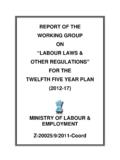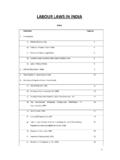Transcription of Labour Laws in Botswana - Making the Law work for you!
1 Labour laws in Botswana Sources of Labour Law include: 1. Legislation Employment Act CAP 47:01 Workers Compensation Act No. 23 of 1998 Trade Unions and Employers Organisations Act, 2003 Employment of Non-Citizens Act CAP 47:02 Trade Disputes Act, 2003 2. Industrial Court Decisions Decisions of the Court create case law. 3. Collective Agreements These are documents that deal with matters relating to the terms and conditions of employment (substantive matters) and disputes resolution procedures (procedural matters). Section 37 of the Trade Disputes Act states that every collective agreement shall be binding upon the parties to the agreement. 4. Contract of employment The relationship between the employer and employee is based on a contract. The employer is obliged to pay wages, an employee has a duty to work for the employer. 5. Custom and Practice Actions that are practiced and accepted over a period of time. 1. Employment Act - CAP 47:01 The Employment Act as amended lays down minimum conditions of employment for employees, whether citizen or expatriate, employed in the private and parastatal sectors.
2 An expatriate employee should be in possession of a valid work permit. Working Hours If the working week is 5 days, then the working day may not be more than 9 hours and a period of rest totaling 1-hour should be provided during the day. If the working week is more than 5 days, then the working day may not be more than 8 hours or more than 48 hours in a week. A break of at least 30 minutes must be given after 5 consecutive hours of work. A rest day of not less than 24 consecutive hours, normally including Sunday, must be given in every period of 7 consecutive days. Shift workers must be given a rest day of at least 30 consecutive hours in a period of 7 consecutive days. Overtime An employee may not work more than 14 hours overtime in any one week. For normal days of work overtime is calculated at one and a half times the basic hourly rate. For rest days or paid public holidays overtime is calculated at double the hourly rate. Paid Public Holidays There are 8 paid public holidays each year, and these include: New Year s Day, Good Friday, Easter Monday, 1st May, President s Day, Day following President s Day, Botswana Day, Christmas Day In the case of domestic employees only 4 of the paid public holidays are applicable and these include: New Year s Day, Good Friday, Botswana Day, and Christmas Day alone.
3 Leave A minimum of 15 working days of paid leave is given per year. At least 8 leave days must be taken within 6 months of the leave earning period. The remaining days may be accumulated for up to 3 years when they must be taken. If the contract is terminated by either party the employee must be paid for any outstanding or accumulated leave. Sick Leave An employee is entitled to a minimum of 14 working days paid sick leave in any one year of continuous employment. The employee must inform the employer as soon as possible and provide a doctor's certificate if they are absent from work for more than 24 hours. Maternity Leave Provision is made for maternity leave totaling 12 weeks (6 weeks before and 6 weeks after confinement) after the employer has been presented with a certificate signed by a doctor, medical nurse or a midwife. An additional 2 weeks maternity leave may be granted on account of illness arising from her confinement. During maternity leave a maternity allowance of not less than 25% of the employee's basic pay or 50 thebe for each day of absence, whichever is greater, is payable.
4 Minimum Wages The following are the current minimum wage rates: 2006/2007 (with effect from May 1st 2006) Employees in the trades/industries below including Casual, Part time employees and Security Guards employed by Security Services Companies Wage Rate per Hour Manufacturing, Service & Repair Trades; Building Construction, Exploration and Quarrying Industries; Hotel, Catering & Entertainment Trades; Garage, Motor Trade & Road Transport; Wholesale Distributive Trade. Security Guards employed by Security Services Companies Retail Distributive Trade Night watchmen in the above trades/industries These rates are adjusted every year around February by the Minimum Wages Advisory Board. Employment Records Employers may by written notice be required to keep records of each employee, including basic personal information, nature of employment, wage details, leave data, etc. Probation Employees, who are to serve a period of probation, should be informed in writing, of the length of the probationary period before entering into a contract of employment.
5 Contracts of employment terminated during a probationary period are deemed to have been terminated with just cause and reasons for such termination shall not be required. Contracts of employment may provide for a probationary period not exceeding three months in the case of unskilled employees, and twelve months in the case of skilled employees. Notice, Suspension & Termination An employer or employee may terminate the contract of employment by giving notice. The minimum notice period is the same as the wage period, an employee who is paid monthly must be given a month's notice. Notice also applies when an employee is on probation. Payment equivalent to the amount that the employee would have received during the period of notice may be made in lieu of giving notice. An employee may be dismissed without notice being given when it can be proved that the employee is guilty of "serious misconduct" in the course of employment.
6 When dealing with cases of termination of employment contracts, the Industrial Court being a Court of law and equity, considers whether such termination is on good and valid grounds by applying tests of procedural fairness and substantive fairness. Severance Benefit: the 5 year service award (Section 2 (3) of the Employment Act, 1992 makes managers, administrators, executives and professional staff eligible for Severance Benefit). An employee who has completed 60 months of continuous employment with one employer regardless of whether the contract of employment has been terminated or not, is due to receive a "severance benefit". This is calculated at the rate of one day's basic pay for each month worked during the first 60 months of continuous employment and two day's basic pay for each additional month of continuous employment. This benefit is not due to employees who will receive a gratuity or a pension at the end of their contract of employment.
7 Repatriation Where an employee has been brought to the place of employment by the employer, the employee has the right to be repatriated, at the employer's expense, to his place of recruitment on termination of the contract of employment. This right applies to both citizen and expatriate employees, regardless of whether the place of recruitment is situated within or outside Botswana . Where the employee's family has been brought to the place of employment by the employer, the family must be repatriated at the expense of the employer in the event of the employee being repatriated or of his death. Employment of Children Section 105 of the Employment Act prohibits the employment of children under the age of 15 in any capacity whatsoever. CHANGES IN THE EMPLOYMENT ACT AS CONTAINED IN THE EMPLOYMENT (AMENDMENT) ACT, 2003 Section 92 A is inserted immediately after section 92 thereof, and requires that in the vent of an employer s insolvency, an employees claims arising out of his employment shall be payable out of the assets of the insolvent employer before non-privileged creditors are paid their shares.
8 The protection extends to claims of: An employee s claims for wages up to three months prior to the insolvency or to the termination of employment. The employee s claims for payment as a result of work performed during holidays within a period of twenty-four (24) months prior to the insolvency or termination of employment. The employee s claims for any amount due to him in respect of other types of paid absence for a period not less than three months prior to the insolvency or termination of employment, and Such severance benefits or other terminal benefits as the employee is entitled to. 2. Worker's Compensation Act No. 23 of 1998 The Worker's Compensation Act No. 23 of 1998 requires an employer to pay compensation to any employee who is incapacitated through a work-related injury or occupational disease. Employers are also required to take up an insurance policy to cover liability under the Act. Permanent Total Incapacity Where the worker suffers permanent total incapacity, compensation is calculated at 60 times monthly earnings multiplied by the percentage of incapacity.
9 In no case shall the amount of compensation be less than P16, or exceed P250, Permanent Partial Incapacity Where the worker suffers permanent partial incapacity, compensation is calculated at 60 times the monthly multiplied by the percentage of incapacity. In no case shall the amount of compensation exceed P200, Fatal In the event of death, the amount of compensation shall not be less than P8, or exceed P200, Medical Expenses Medical, surgical, dental hospital treatment, skilled nursing and supply of medicines expenses - P75, Supply, fitting, maintenance, repair and renewal of artificial appliances P10, Transport charges P1, 3. Trade Unions and Employers Organisations Act, 2003 The Trade Unions and Employers' Organisations Act of 1984 as amended makes provision for and sets out the rules for three categories of organisation: trade unions, federations of trade unions and employers' organisations.
10 A trade union is an organisation of employees with a minimum of 30 members, whose main aims are to regulate relations between employees and employers or employers' organisations, or between employees and employees. Registration with the Registrar of Trade Unions and Employers' Organisations is compulsory. No employer may make membership or non-membership of a trade union a condition of employment. Federations of Trade Unions Any two or more registered trade unions may with the consent of the Minister form a federation of trade unions or amalgamate together as one trade union. Employers' Organisations An employers' organisation is an association made up wholly or mainly of employers whose main aims are to regulate the relations between employers and employees or trade unions. CHANGES IN THE TRADE UNIONS AND EMPLOYERS ORGANISATIONS ACT Provisions in the above Act were found to be too restrictive to freedom of association and collective bargaining.






